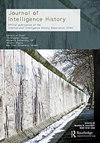Swedish and British security officialdom, a suspected spy, and information management in the era of the Second World War
引用次数: 0
Abstract
ABSTRACT This article discusses Swedish and British security officialdom with a focus on information-management techniques in a pre-electronic information order. It examines the challenges security officials faced in investigating a Finnish sea captain suspected of espionage during the Second World War. Information about him emanated from three communication contexts – a police station, an interrogation centre, and an immigration office. The British security establishment was confronted with information asymmetries; although information about the case existed in the files, it was not available to officials working in different temporal and geographical settings. There were also marked differences between the bureaucratic cultures of Swedish and British security agencies regarding assessment and reporting of security information. The article shows that the captain worked for the German military intelligence and maintained contact with British officials in Stockholm, but was never imprisoned. On the basis of this case, four suspect interrogation survival strategies can be delineated: playing the victim, seeking favour by flattery, bold exaggeration and appeals to ideological congruence. To some extent, these survival strategies contradict the conventional wisdom in criminal-psychological research on the behaviour of guilty suspects. Rather than keeping stories simple, the sea captain inundated the interrogators with bizarre details to avoid detection.第二次世界大战时期瑞典和英国的安全官员,一名间谍嫌疑人,以及信息管理人员
本文章由计算机程序翻译,如有差异,请以英文原文为准。
求助全文
约1分钟内获得全文
求助全文
来源期刊

Journal of Intelligence History
Arts and Humanities-History
CiteScore
0.50
自引率
0.00%
发文量
21
期刊介绍:
The Journal of Intelligence History is the official publication of the International Intelligence History Association (IIHA). It is an international peer-reviewed journal that aims to provide a forum for original research on the history of intelligence services, activities and their wider historical, political and social contexts. The journal aims to publish scholarship on all aspects of the history of intelligence, across all continents, countries and periods of history. We encourage submissions across a wide range of topics, methodologies and approaches.
 求助内容:
求助内容: 应助结果提醒方式:
应助结果提醒方式:


